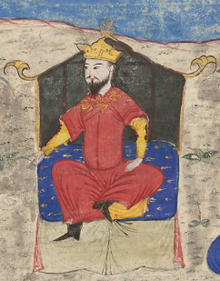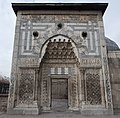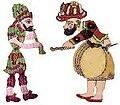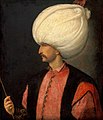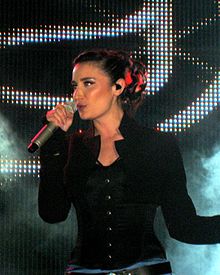Portal:Turkey
Merhaba! Türkiye portalına hoş geldiniz. Hi! Welcome to the Turkey portal.
 | |
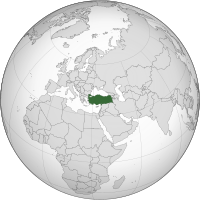
| |
Turkey, officially the Republic of Türkiye, is a country mainly located in Anatolia in West Asia, with a smaller part called East Thrace in Southeast Europe. It borders the Black Sea to the north; Georgia, Armenia, Azerbaijan, and Iran to the east; Iraq, Syria, and the Mediterranean Sea to the south; and the Aegean Sea, Greece, and Bulgaria to the west. Turkey is home to over 85 million people; most are ethnic Turks, while ethnic Kurds are the largest ethnic minority. Officially a secular state, Turkey has a Muslim-majority population. Ankara is Turkey's capital and second-largest city, while Istanbul is its largest city and economic and financial center. Other major cities include İzmir, Bursa, and Antalya.
Turkey was first inhabited by modern humans during the Late Paleolithic. Home to important Neolithic sites like Göbekli Tepe and some of the earliest farming areas, present-day Turkey was inhabited by various ancient peoples. The Hattians were assimilated by the Anatolian peoples, such as the Hittites. Classical Anatolia transitioned into cultural Hellenization following the conquests of Alexander the Great; Hellenization continued during the Roman and Byzantine eras. The Seljuk Turks began migrating into Anatolia in the 11th century, starting the Turkification process. The Seljuk Sultanate of Rum ruled Anatolia until the Mongol invasion in 1243, when it disintegrated into Turkish principalities. Beginning in 1299, the Ottomans united the principalities and expanded; Mehmed II conquered Istanbul in 1453. During the reigns of Selim I and Suleiman the Magnificent, the Ottoman Empire became a global power. From 1789 onwards, the empire saw a major transformation, reforms, and centralization while its territory declined.
In the 19th and early 20th centuries, persecution of Muslims during the Ottoman contraction and in the Russian Empire resulted in large-scale loss of life and mass migration into modern-day Turkey from the Balkans, Caucasus, and Crimea. Under the control of the Three Pashas, the Ottoman Empire entered World War I in 1914, during which the Ottoman government committed genocides against its Armenian, Greek, and Assyrian subjects. Following Ottoman defeat, the Turkish War of Independence resulted in the abolition of the sultanate and the signing of the Treaty of Lausanne. The Republic was proclaimed on 29 October 1923, modelled on the reforms initiated by the country's first president, Mustafa Kemal Atatürk. Turkey remained neutral during most of World War II, but was involved in the Korean War. Several military interventions interfered with the transition to a multi-party system.
Turkey is an upper-middle-income and emerging country; its economy is the world's 17th-largest by nominal and 12th-largest by PPP-adjusted GDP. It is a unitary presidential republic. Turkey is a founding member of the OECD, G20, and Organization of Turkic States. With a geopolitically significant location, Turkey is a regional power and an early member of NATO. An EU candidate, Turkey is part of the EU Customs Union, CoE, OIC, and TURKSOY.
Turkey has coastal plains, a high central plateau, and various mountain ranges; its climate is temperate with harsher conditions in the interior. Home to three biodiversity hotspots, Turkey is prone to frequent earthquakes and is highly vulnerable to climate change. Turkey has a universal healthcare system, growing access to education, and increasing levels of innovativeness. It is a leading TV content exporter. With 21 UNESCO World Heritage sites, 30 UNESCO intangible cultural heritage inscriptions, and a rich and diverse cuisine, Turkey is the fifth most visited country in the world. (Full article...)
Selected article -
Alp Arslan born Muhammad Alp Arslan bin Dawud Chaghri, was the second sultan of the Seljuk Empire and great-grandson of Seljuk, the eponymous founder of the dynasty. He greatly expanded the Seljuk territory and consolidated his power, defeating rivals to the south, east and northwest, and his victory over the Byzantines at the Battle of Manzikert, in 1071, ushered in the Turkmen settlement of Anatolia. (Full article...)
General images
Did you know -
- ... that Süreyya Opera House in Istanbul, built in 1927 as a musical theater but used all the time as a cinema, gained its intended status only in 2007 after redevelopment? (October 30, 2008) Wikipedia:Recent additions 234
- ... that the Balaban Aga Mosque in Istanbul, built in the Byzantine era, was demolished in 1930 because it stood in the way of a new road? (May 8, 2012)
- ... that the remains of the Bogdan Saray in Istanbul lie inside a tire shop? (April 13, 2012)
- ... that SantralIstanbul, a modern art museum in Istanbul, Turkey, is located in what was the first power station of the Ottoman Empire? (November 22, 2007) Wikipedia:Recent additions 189
- ... that the Sultan Bayezid II Mosque is the oldest surviving Ottoman imperial mosque complex in Istanbul, Turkey? (August 13, 2008) Wikipedia:Recent additions 226
- ... that the crash of Turkish Airlines Flight 634 on 8 January 2003 was the worst crash involving a BAe 146? (January 4, 2009) Wikipedia:Recent additions 238
- ... that footballer Hasan Ahmet Sari left Istanbul with his family after living through the 1999 İzmit earthquake? (August 18, 2011)
Selected picture
Selected biography -
Sıla Gençoğlu (born 17 June 1980) is a Turkish singer-songwriter. She was born in Acıpayam, Denizli, and later moved to İzmir and then to Istanbul to finish her studies. She started to learn performing arts at high school. After studying jazz at Istanbul Bilgi University, she became a backing vocalist for Kenan Doğulu.
Sıla released her self-titled debut album in 2007. The song "...Dan Sonra" became a number-one hit on Türkçe Top 20, and after critical and commercial success she released the albums İmza (2009), Konuşmadığımız Şeyler Var (2010), Vaveyla (2012), Yeni Ay (2014) and Mürekkep (2016) all of which were praised by fans and critics alike. A number of songs in these albums, including "Sevişmeden Uyumayalım", "Acısa da Öldürmez", "Kafa", "Boş Yere", "Vaziyetler", "Yabancı" and "Hediye", became number-one hits in Turkey. The songs "Yoruldum", "İmkânsız" and "Zor Sevdiğimden" ranked among the top five on Turkey's music charts. (Full article...)
Selected video -
Selected quote -
| “ | Today the Soviet Union is a friend and an ally. We need this friendship. However, no one can know what will happen tomorrow. Just like the Ottoman and Austro-Hungarian Empires it may tear itself apart or shrink in size. The people that it holds so tightly in its grip may one day slip away. The world may see a new balance of power. It is then that Turkey must know what to do. Ally Soviets have under their control our brothers with whom we share language, beliefs and roots. We must be prepared to embrace them. Being ready does not mean that we will sit quietly and wait. We must get ready. How does a people get prepared for such an endeavour? By strengthening the natural bridges that exist between us. Language is a bridge... Religion is a bridge... History is a bridge... We must delve into our roots and reconstruct what history has divided. We can't wait for them to approach us. We must reach out to them. | ” |
Recognized content
Provinces
Related portals
Religions in Turkey
Neighbouring countries
Countries with related heritage
WikiProjects
Turkish wikipedia
 |
There is a Turkish version of Wikipedia, the free encyclopedia. |
Wikimedia
The following Wikimedia Foundation sister projects provide more on this subject:
-
Commons
Free media repository -
Wikibooks
Free textbooks and manuals -
Wikidata
Free knowledge base -
Wikinews
Free-content news -
Wikiquote
Collection of quotations -
Wikisource
Free-content library -
Wikiversity
Free learning tools -
Wikivoyage
Free travel guide -
Wiktionary
Dictionary and thesaurus


